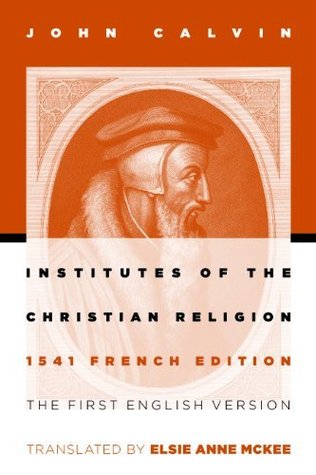More on this book
Community
Kindle Notes & Highlights
by
John Calvin
The argument is that the 1541 Institutes with its classical elegance became the ideal in the seventeenth century, while in Calvin's own day a much freer idea of translation was the norm. In translating newly added sections of the Latin for later editions of the French Calvin came much closer to making the Institutes fit his audience. This would be logical, as he gained more experience in communicating complex theology in a language which did not at first have the vocabulary to support it; it was also pastoral.
The English translation of Calvin's 1541 Institutes thus provides an intermediate edition between 1536 and 1559, and a first English version of the reformer's own pastorally-oriented French Institutes, with the added interest of making a classic of French literature available in English.
We cannot ardently desire God before we have begun to be completely dissatisfied with ourselves. For what person does not choose to depend on himself? Who does not rely on himself so long as (since he does not know himself) he is happy with his own abilities and does not see his calamity? That is why each of us is not only prompted to seek God by the knowledge of himself, but also guided and practically led by the hand to find Him.
We see that those, who were firm and sure when the Lord was not present, are destabilized and frightened as soon as the Lord shows His glory, so that they are practically swallowed up in the fear of death and almost reduced to nothing. From that we may see that a person is never sufficiently pierced by the
knowledge of his own weakness until after he has compared himself with God's majesty.
Now, as even pagans confess, there is no nation so uncivilized, no people so wild, that it does not have imprinted on the heart that there is some god.' Those who seem not to differ from brute beasts in any other aspect of life nevertheless always retain some seed of religion, so that this universal concept has taken root in every spirit and is fixed in every heart. Since from the beginning of the world there has never been a region or city or even a house which could do without religion, we have a tacit confession that
there is a sense of divinity engraved in the hearts of all people. Even
...more
but they would not have succeeded in this if people's spirits had not first been fixed on the firm persuasion that there is a God.
For how can some idea of God come into your mind without your immediately thinking (since you are His creation) that by the right of creation you are subject to His rule?
On the other hand, you cannot understand Him clearly unless you acknowledge that He is the fountain and source of all good. From that reflection a desire to be joined to Him and a confidence in His goodness would be produced, if the human understanding were not turned away from the right pursuit by its perversity.
Yet this seed is so corrupted that it only produces bad fruit, and so here we sin chiefly in two ways. The first is that, to seek God's truth, wretched people do not rise above their nature, as would be fitting, but they measure His greatness according to the weakness of their senses. They do not understand Him at all as He has given Himself to be known, but imagine Him as they have made Him by their presumption.
Thus it is no wonder that most of the world has erred in this matter, for since people have a disordered and blind love of themselves, they gladly believe that there is nothing in themselves worthy of being despised.
Therefore, although God's truth agrees with the common judgment of all people that the second part of our wisdom consists in the knowledge of ourselves, yet there is a great difference in the way of knowing ourselves. For according to fleshly opinion, it seems that a person knows himself very well when, trusting in his understanding and his power, he takes heart to apply himself to doing his duty and, renouncing his vices, strives to do what is good and honorable. But one who takes a good look at himself according to the rule of God's judgment will find nothing which can puff up his heart with
...more
For he was joined to Him by participation in all good things, to live eternally if he had persevered in the integrity which he had received. But he did not remain there long. For by his ingratitude he quickly made himself unworthy of all the benefits which God had given him. So he erased the heavenly image which he bore, and since he was alienated from God by sin, he was likewise excluded from the communion of all the goods which can not be had anywhere except in Him. For this reason, in place of wisdom, power, holiness, truth, righteousness, with which he had been clothed in the likeness of
...more


